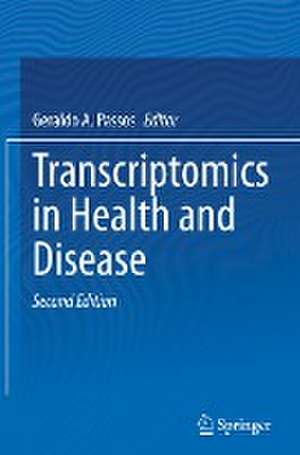Transcriptomics in Health and Disease
Editat de Geraldo A. Passosen Limba Engleză Hardback – 8 mar 2022
| Toate formatele și edițiile | Preț | Express |
|---|---|---|
| Paperback (1) | 1034.83 lei 6-8 săpt. | |
| Springer – 21 oct 2016 | 1034.83 lei 6-8 săpt. | |
| Hardback (1) | 1232.09 lei 6-8 săpt. | |
| Springer International Publishing – 8 mar 2022 | 1232.09 lei 6-8 săpt. |
Preț: 1232.09 lei
Preț vechi: 1502.55 lei
-18% Nou
Puncte Express: 1848
Preț estimativ în valută:
235.79€ • 245.26$ • 194.66£
235.79€ • 245.26$ • 194.66£
Carte tipărită la comandă
Livrare economică 15-29 aprilie
Preluare comenzi: 021 569.72.76
Specificații
ISBN-13: 9783030878207
ISBN-10: 3030878201
Pagini: 474
Ilustrații: XI, 474 p. 67 illus., 62 illus. in color.
Dimensiuni: 155 x 235 mm
Greutate: 0.86 kg
Ediția:2nd ed. 2022
Editura: Springer International Publishing
Colecția Springer
Locul publicării:Cham, Switzerland
ISBN-10: 3030878201
Pagini: 474
Ilustrații: XI, 474 p. 67 illus., 62 illus. in color.
Dimensiuni: 155 x 235 mm
Greutate: 0.86 kg
Ediția:2nd ed. 2022
Editura: Springer International Publishing
Colecția Springer
Locul publicării:Cham, Switzerland
Cuprins
1. What is the transcriptome and how it is evaluated?.- 2. ALTERNATIVE SPLICING OF PRE-MESSENGER RNA.- 3. Transcriptome Analysis Using RNA-seq and scRNA-seq.- 4. TRANSCRIPTOMICS OF NEONATAL AND INFANT HUMAN THYMUS.- 5. Transcriptomics at the single cell level and human diseases: opportunities and challenges in data processing and analysis.- 6. METHODS FOR GENE CO-EXPRESSION NETWORK VISUALIZATION AND ANALYSIS.- 7. Comparative Analysis of Packages and Algorithms for the Analysis of Spatially Resolved Transcriptomics Data.- 8. The Interplay Between the Transcriptomics and Proteomics Profiles.- 9. TRANSCRIPTOME DURING NORMAL CELL DIFFERENTIATION.- 10. Transcriptomics to dissect the Immune System.- 11. Transcriptome Profiling in Autoimmune Diseases.- 12. Transcriptome Profiling in Experimental Inflammatory Arthritis.- 13. TRANSCRIPTOMICS AND IMMUNE RESPONSE IN HUMAN CANCER.- 14. MicroRNAs in Cancer.- 15. OxidativeStress, DNA Damage and Transcriptional Expression of DNA Repair and Stress Response Genes in Diabetes Mellitus.- 16. Large-scale gene expression in monogenic and complex genetic diseases.- 17. Transcriptome in Human Mycoses.- 18. Understanding Chagas Disease by Multi-omics data Integration, Functional and Enrichment Computational Analysis.
Notă biografică
Geraldo Aleixo Passos received his PhD degree in biochemistry (1988) from Ribeirão Preto Medical School, University of São Paulo, USP, Brazil. His postdoctoral studies were conducted at the Molecular Genetics Institute of Montpellier (CNRS), France (1992-94) with sequencing and physical mapping of the human immunoglobulin lambda locus on chromosome 22q11.2. For several years, he worked in close collaboration with the microarray laboratory at Centre d´Immunologie de Marseille-Luminy (CIML, Marseille, France) (1999-2001) and then the Unité INSERM 1090 in Marseille (2002-17) to study the large-scale gene expression in the thymus. He is currently Associate Professor (Genetics and Molecular Biology) at School of Dentistry and Ribeirão Preto Medical School (USP, Campus of Ribeirão Preto, Brazil) in which he is the coordinator of the Molecular Immunogenetics Group.
Textul de pe ultima copertă
The study of transcriptomics is key to understanding complex diseases. This new edition will build on the foundation of the first edition while incorporating the progress that has been made in the field of transcriptomics in the past six years, including bioinformatics for data analysis. Written by leading experts, chapters address new subjects such as methodological advances in large-scale sequencing, the sequencing of single-cells, and spatial transcriptomics. The new edition will address how transcriptomics may be used in combination with genetic strategies to identify causative genes in monogenic and complex genetic diseases. Coverage will also explore transcriptomics in challenging groups of diseases, such as cancer, inflammation, bacterial infection, and autoimmune diseases. The updated volume will be useful for geneticists, genome biologists, biomedical researchers, molecular biologists, bioinformaticians, and students, among others.
Caracteristici
Describes how to study the “functional” and the “non-functional” transcriptome Provides timely updates on advances in the field of transcriptomics in the six years since the first edition Addresses the role of transcriptomics in challenging groups of diseases and complex genetic diseases
